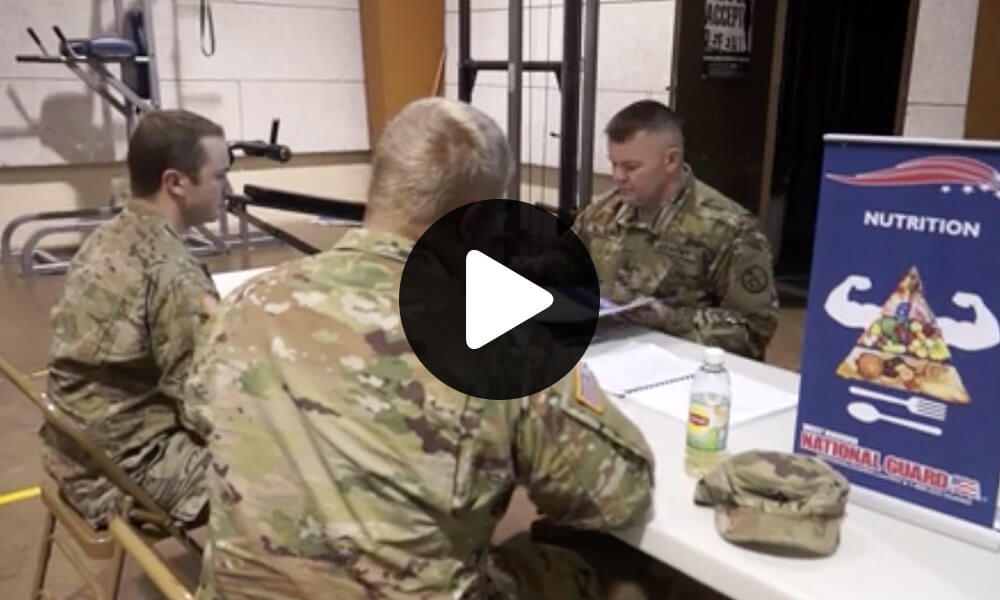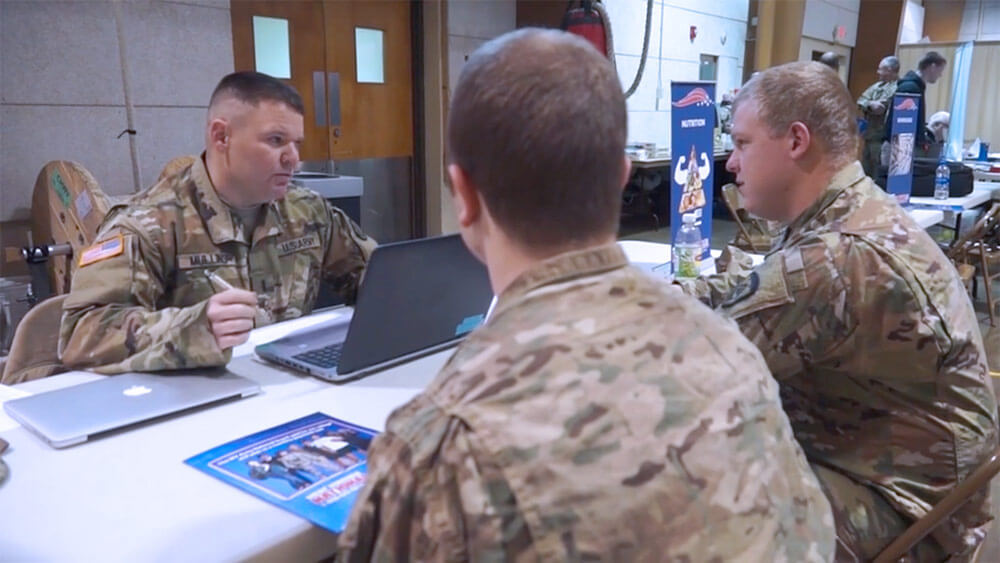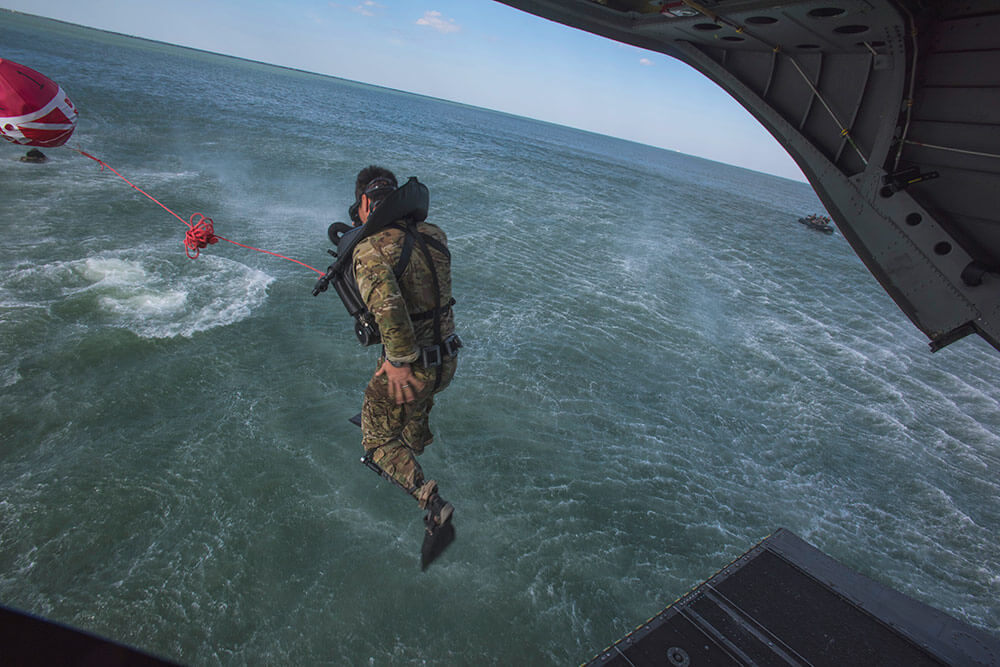West Virginia Army National Guard Welcomes First Dietician in the Guard
Maintaining a fit and ready force is an ongoing priority for the Army National Guard. When looking to further advance this priority, the West Virginia Army National Guard saw a need to take things to the next level.
“There was a push for more subject matter experts in the field of exercise and nutrition within the State,” said 1LT Jeremy Mullins, the first official Army National Guard dietician.
Heretofore, the dietician MOS (65C) was only available in the active duty component. But West Virginia Army National Guard CSM James Allen saw a need for performance dieticians at the State level and lobbied through National Guard Bureau to get the position in West Virginia.
Part of the West Virginia Army National Guard Medical Detachment, 1LT Mullins has been working with the West Virginia National Guard since September 2015. He began his career with the Guard as a civilian contractor working as a health and wellness coach for the West Virginia National Guard Tactical Fitness and Nutrition Training (TFNT) program. 1LT Mullins said that he went back to school and obtained his clinical dietitian license because he wanted to be part of bringing a more holistic program to the Soldiers of the West Virginia Guard.
His civilian job as owner of both a strength and conditioning facility, and a farm-to-table restaurant gives 1LT Mullins unique insight into health trends not just within the Guard, but also in the country’s overall society.
“Each Armed Force is struggling a bit with height and weight failures and that has slowly increased over the last two decades,” 1LT Mullins said. “There’s an education piece that’s lacking. And that’s not just for Soldiers, it’s our Nation overall. There has been little to no education on how to eat correctly or how to eat for performance. There hasn’t been education on how to train. There’s been ‘how to train for the APFT [Army Physical Fitness Test],’ but there hasn’t been ‘how to properly weight train’ or ‘how to properly do high-intensity training.’”
After receiving his clinical license, 1LT Mullins commissioned into the West Virginia Army National Guard in August of 2017 and now, as the National Guard’s first dietician, is using his expertise to help his fellow Soldiers become healthier individuals through a newly re-worked fitness program.
“I’m humbled and honored for the opportunity,” 1LT Mullins said. “I’ve always been interested in health and fitness. I struggled with my weight as an adolescent, so it was something I took an interest in for me. My career has always been around health and fitness, no matter what facet it may have been.”
The core responsibility of the dietician MOS is to improve the readiness of Soldiers through diet assessment and education. To do this, 1LT Mullins provides Soldiers, who may voluntarily opt into the program or may be assigned into the program depending on their fitness levels and APFT pass rates, with the information and resources needed to create realistic health and fitness goals.
“It’s very education-based,” said 1LT Mullins. “It’s about teaching Soldiers the foundations of nutrition and leading them in the correct direction versus them just [doing] the next great diet plan they see out there.”
Based on individual Soldier need, 1LT Mullins creates diet and exercise plans that coincide with requirements to meet height and weight standards.
“You have some Soldiers who need to drop body fat, but on the flip side, we also have Soldiers who may need to gain muscle tissue,” 1LT Mullins explained. “Or we’ll have a unit that is being deployed and needs to know how to eat while [away] or while training for deployment. It’s really dictated by the individual Soldier.”
1LT Mullins said he has seen marked progress from many of the Soldiers he has worked with through the TFNT program. Some have lost 50–80 pounds of weight, allowing them to meet Army standards and continue their service in the Guard. 1LT Mullins commented in particular on the progress from Soldiers in the West Virginia National Guard’s holistic tactical camp, which currently has a 60 percent success rate.
“[The camp] is a week-long session where we teach Soldiers the foundations of not only diet and nutrition, but also sleep, recovery and how to train,” he explained. “We measure the success rate by the Soldiers’ progress. Progress may be weight loss or increasing their pushups or sit-ups. Say a Soldier is 60 pounds overweight and has lost 40 and still has 20 to go – we still say that’s a success.”
1LT Mullins expressed his appreciation for the dietician position that is allowing him to provide Soldiers with the tools they need to live healthier lives.
“My favorite aspect is being able to help someone make their life better,” he said. “I’m currently helping Kentucky and Massachusetts develop holistic programs within their States, so that’s been great too. Two years ago, I would not have been able to do that as a civilian. As a Soldier, I can go on crossover orders and I can go help others. It just feels good to be able to help more people and more States in this part of my career.”
By Staff Writer Tatyana White-Jenkins



